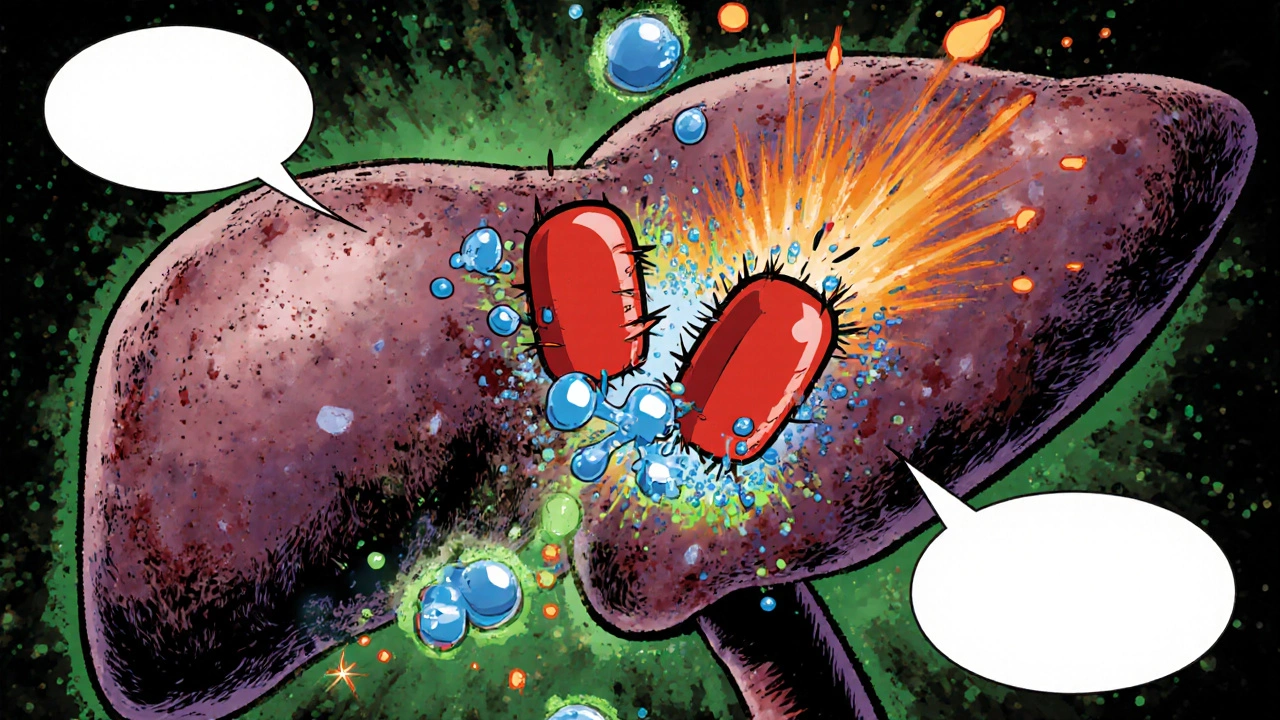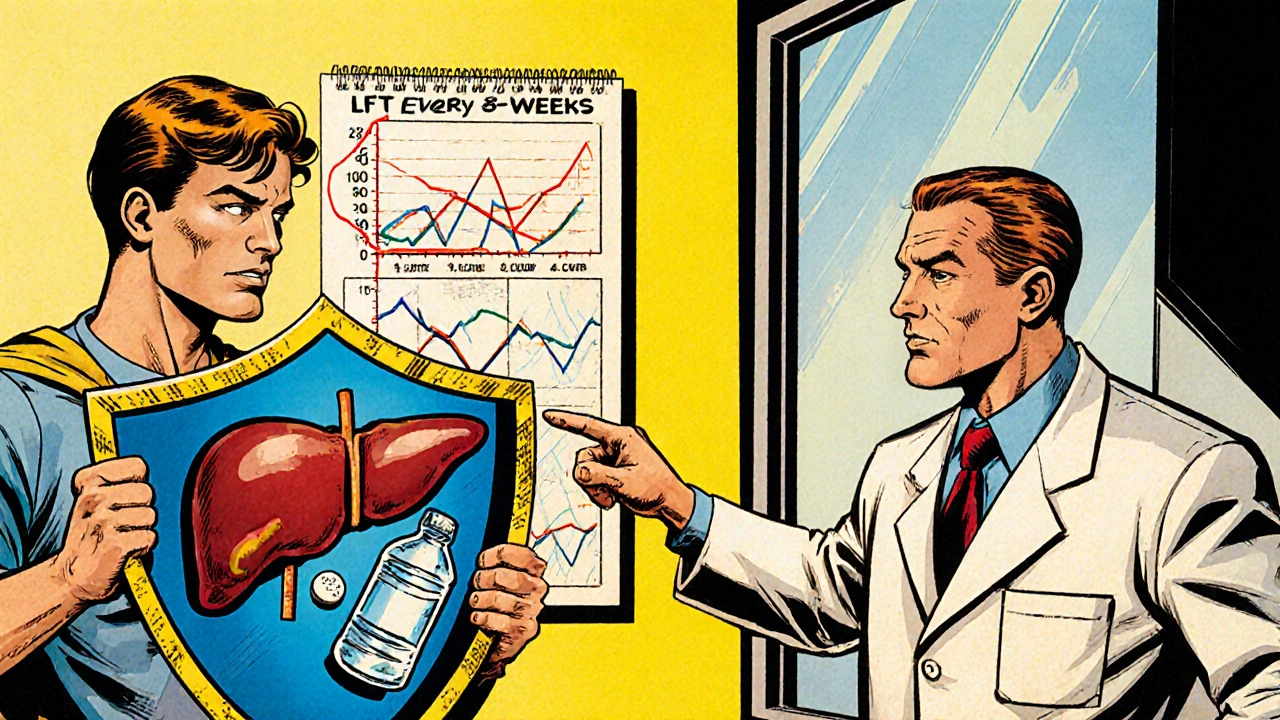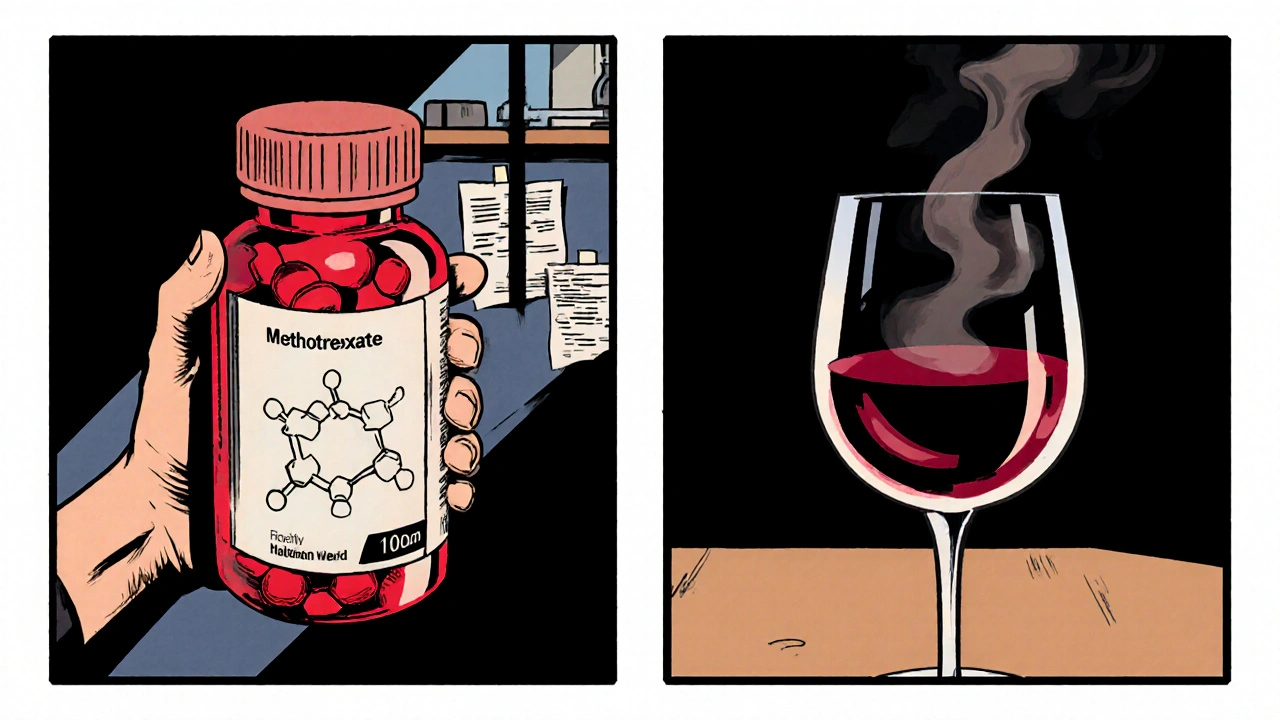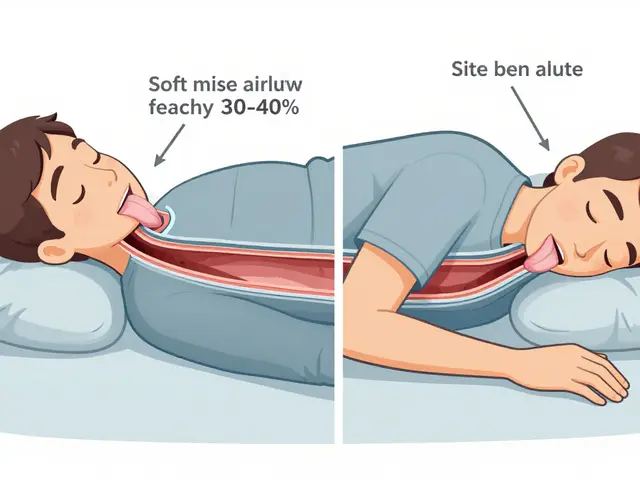Methotrexate Alcohol Risk Calculator
Alcohol Risk Assessment
Based on ACR/EULAR guidelines for methotrexate users
Risk Assessment
Recommended Action
Ever wondered why a glass of wine can feel harmless, but suddenly your doctor warns you to stop drinking while on a certain pill? When Methotrexate is prescribed for rheumatoid arthritis, psoriasis, or certain cancers, that warning often points to a hidden chemistry between the drug and alcohol.
What is Methotrexate?
Methotrexate is a folate antagonist that blocks an enzyme called dihydrofolate reductase, slowing cell division. It’s a workhorse in oncology and a first‑line disease‑modifying drug for autoimmune conditions like Rheumatoid arthritis and Psoriasis. By dampening the immune system, it reduces joint inflammation and skin lesions, but it also affects fast‑growing cells in the liver, gut, and bone marrow.
Why Alcohol Matters
Alcohol is metabolised mainly in the Liver via the enzyme family CYP450. When you drink, the liver focuses on breaking down ethanol, which can crowd out other metabolic pathways. methotrexate also relies on liver enzymes for clearance, so the two compete for the same machinery.
Mechanisms of Interaction
- Increased hepatotoxicity: Both alcohol and methotrexate generate reactive oxygen species. Together they amplify liver cell damage, leading to elevated ALT/AST levels.
- Folate depletion: Methotrexate blocks folate, while alcohol interferes with folate absorption and conversion, worsening deficiency‑related anemia and mucosal ulceration.
- Renal strain: High‑dose methotrexate is cleared by the kidneys. Alcohol‑induced dehydration can reduce renal perfusion, raising drug concentrations and risk of toxicity.
- Immune suppression: Alcohol itself dampens immune response; combined with methotrexate, infection risk spikes.
Clinical Evidence and Statistics
Several cohort studies from 2019‑2024 show a clear dose‑response relationship. Patients drinking more than three standard drinks per week while on methotrexate had a 2.5‑fold higher odds of liver fibrosis compared with abstinent patients (HR=2.5, 95%CI1.8‑3.4). A 2022 meta‑analysis of 12 trials found that concurrent heavy alcohol consumption increased the incidence of grade3‑4 hepatotoxicity from 6% to 14%.

Guidelines from Professional Bodies
Both the American College of Rheumatology (ACR) and the European League Against Rheumatism (EULAR) recommend limiting alcohol to ≤2 drinks per week for patients on methotrexate. The British Society for Rheumatology adds that any regular consumption above this threshold should trigger liver function monitoring every 4‑6weeks.
How to Manage Alcohol While on Methotrexate
- Assess your baseline: Before starting methotrexate, get a full liver panel (ALT, AST, GGT, bilirubin) and folate level.
- Set a safe limit: If you choose to drink, stick to 1standard drink (≈10g ethanol) per week, preferably on a non‑dose day.
- Stay hydrated: Drink plenty of water to support renal clearance, especially on the day you take methotrexate.
- Take folic acid: Supplement 1mg of folic acid daily, except on methotrexate dosing days when a lower‑dose (5mg) is often advised.
- Monitor regularly: Schedule liver function tests every 8weeks; if values rise, reduce or stop alcohol immediately.
What Happens If You Accidentally Exceed the Limit?
Short‑term binge drinking can cause a temporary spike in liver enzymes, but the real danger lies in cumulative damage. If you notice nausea, yellowing of the skin, or persistent fatigue, contact your clinician fast. They may pause methotrexate, order imaging (ultrasound or FibroScan), and adjust your folate supplementation.

Common Questions Patients Ask
| Weekly Alcohol Units | Interaction Risk | Recommended Action |
|---|---|---|
| 0‑1 | Low | Proceed with routine monitoring |
| 2‑3 | Moderate | Increase LFT monitoring to every 4weeks |
| 4‑7 | High | Consider reducing dose or switching therapy |
| ≥8 | Very High | Alcohol abstinence recommended |
Bottom Line
Alcohol isn’t an outright contraindication for methotrexate, but the partnership can turn a manageable medication into a liver‑dangerous regimen. By understanding the chemistry, keeping tabs on liver numbers, and staying within modest drinking limits, you can safely reap the benefits of methotrexate without the added risk.
Frequently Asked Questions
Can I have a glass of wine on the day I take methotrexate?
One standard drink on a non‑dose day is generally acceptable, but you should keep the total weekly intake under the recommended limit and monitor liver tests.
Why does folate matter when drinking alcohol on methotrexate?
Methotrexate blocks folate metabolism, and alcohol further reduces folate absorption. Low folate can worsen anemia, mouth sores, and liver injury, so supplementation is crucial.
If my liver enzymes rise, should I stop methotrexate immediately?
A mild increase often leads doctors to pause the drug and repeat testing in 2-4weeks. A sharp rise (more than three times the upper limit) usually warrants stopping methotrexate and reassessing alcohol use.
Are there safer alternatives to methotrexate if I can’t quit drinking?
Biologic agents such as adalimumab or etanercept have different metabolic pathways and less hepatotoxic potential, but they come with their own cost and infection risks. Discuss options with your rheumatologist.
How often should I get liver function tests while drinking moderately?
For moderate drinkers (≤2 drinks/week), most guidelines suggest checking LFTs every 8weeks. If you exceed that, move to every 4‑6weeks.







15 Comments
Matt Tait
If you think a single glass of wine is harmless while on methotrexate, you're living in a fantasy. The drug already taxes your liver, and adding ethanol is like pouring gasoline on a fire. Stop kidding yourself and talk to your doctor before you wreck your liver.
Benton Myers
That’s a fair point, but the guidelines do allow a modest amount if you keep an eye on your labs. Just remember to stay consistent with timing.
Pat Mills
Methotrexate’s role as a folate antagonist is well‑established in both oncology and rheumatology, and its hepatic metabolism is a critical consideration for safety. Alcohol, on the other hand, is a potent inducer of cytochrome P450 enzymes and competes for the same hepatic clearance pathways that methotrexate relies on. When both substances are present, the liver’s capacity to detoxify reactive oxygen species is overwhelmed, leading to a synergistic rise in ALT and AST levels. Moreover, the concurrent depletion of folate-by methotrexate’s inhibition of dihydrofolate reductase and alcohol’s interference with folate absorption-exacerbates anemia and mucosal ulceration. Clinical studies from the past five years consistently demonstrate a dose‑response curve, where consuming more than two standard drinks per week doubles the risk of developing significant fibrosis. A 2022 meta‑analysis even showed that heavy drinkers on methotrexate experienced grade‑3 or higher hepatotoxicity in 14 % of cases versus 6 % among abstinent patients. The American College of Rheumatology and EULAR both codify these findings into a recommendation of no more than two drinks weekly, with tighter monitoring for anyone exceeding that threshold. Regular liver function tests every eight weeks become essential, and many clinicians now opt for a four‑week interval if alcohol intake creeps above the guideline. Renal clearance is another axis of concern; dehydration from alcohol can reduce glomerular filtration, causing methotrexate to linger longer in the bloodstream. This pharmacokinetic lag translates into higher systemic exposure, which in turn raises the probability of bone‑marrow suppression and opportunistic infections. Patients often wonder whether a single glass on a non‑dose day is safe, and while the evidence suggests occasional minimal exposure may be permissible, the cumulative effect cannot be ignored. Folic acid supplementation-typically 1 mg daily-mitigates some of the folate‑related toxicities, but it does not offset the hepatic oxidative burden. Therefore, a holistic approach that includes alcohol moderation, folate repletion, hydration, and vigilant laboratory surveillance is the most pragmatic strategy. If you notice any signs of jaundice, persistent fatigue, or unexplained nausea, you should contact your physician immediately for possible dose adjustment or temporary cessation. In summary, methotrexate and alcohol can coexist, but only under strict limits and with proactive monitoring to prevent irreversible liver damage.
neethu Sreenivas
It’s understandable to feel torn between enjoying a social drink and protecting your health 🌱. Think of your liver as a wise teacher; when you overburden it, the lesson is often a painful one. Keeping your intake low lets you honor the medication’s benefits while still savoring life’s moments 🙏.
Keli Richards
While the science is clear you should limit intake it is still possible to have a occasional drink as long as you stay within the recommended limits and keep your labs checked regularly
Ravikumar Padala
Reading through the article feels like wading through a textbook that never gets to the point. The author does a decent job listing the biochemical interactions, but the sheer amount of jargon makes it hard for a layperson to stay engaged. Moreover, the guidelines are repeated multiple times, which could have been condensed into a single bullet point. I appreciate the effort to include tables, yet the formatting is a bit clunky and some of the data seems cherry‑picked. In practice, most patients will just ask their doctor for a simple answer, not a dissertation on CYP450 enzymes. Still, the takeaway about moderation is solid and worth emphasizing. Perhaps a short summary at the top would help readers grasp the key messages without getting lost in the details.
King Shayne I
Yo stop ignorng the real risk. If u keep downin that booz its only gonna wreck ur liver faster. Docs said it for a reason
jennifer jackson
Stay safe and enjoy life!
Brenda Martinez
Let me be perfectly clear: anyone who flippantly assumes a glass of wine is “harmless” while on methotrexate is playing Russian roulette with their liver. The data are unambiguous, yet the denial persists like a bad pop‑culture myth. You’re not just risking a transient lab spike; you’re courting chronic fibrosis that can end in cirrhosis. Ignorance in this arena is not just foolish-it’s dangerously selfish. Wake up, read the guidelines, and respect the chemistry before you ruin your future.
Marlene Schanz
i think the main point is keep alcohol low and get regular LFTs. also folate supplements can help a lot. dont forget to hydrate especially on methotrexate days. this way you can stay safe and still enjoy occasional drinks.
Matthew Ulvik
Hey folks 😊, just wanted to say that staying within 1‑2 drinks a week and checking your liver tests every couple of months is a solid plan. If you ever feel unsure, a quick chat with your rheumatologist can clear things up. Keep it simple and stay healthy!
Dharmendra Singh
The key takeaway is balance. Limit intake, take folic acid, monitor labs and stay hydrated. If you follow these steps you can minimize the risk of hepatotoxicity while benefiting from methotrexate.
Rocco Abel
Undoubtedly, the pharmaceutical industry has vested interests in downplaying the synergistic toxicity of alcohol and methotrexate. While the literature cites “guidelines,” many of those recommendations are filtered through corporate influence, subtly encouraging patients to ignore the real danger. A discerning reader will recognize that the safest course is to abstain entirely, bypassing any compromised advisory board. Moreover, the “≤2 drinks per week” rule feels like a polite concession rather than a scientifically rigorous threshold. In short, question the source, and prioritize your own health over the sanitized pamphlet.
Dawn Mich
Stop trusting the “official” numbers-they're fabricated to protect pharma profits. The real risk of liver damage is far higher than the studies admit, especially when patients hide their drinking habits. If you value your health, reject the half‑truths and commit to zero alcohol while on methotrexate.
Eric Sevigny
Sure, you could ignore the warnings and hope for the best, but that’s a risky gamble. A more sensible approach is to follow the modest drinking limits and keep up with regular blood work. That way you avoid unnecessary complications and keep the doctors happy.